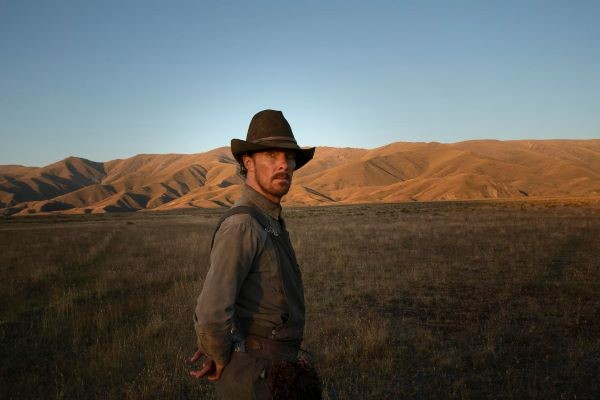![]() For her first film in more than a decade, director Jane Campion performs a seductive sleight of hand in her adaptation of American writer Thomas Savage’s 1967 shapeshifting novel. Campion’s sinewy saga ostensibly feels like a Western before it turns into something entirely else. Or, maybe it should be described as a Western-influenced hothouse drama, mainly for its setting, Montana 1925, and the mythology surrounding the rugged American cowboy.
For her first film in more than a decade, director Jane Campion performs a seductive sleight of hand in her adaptation of American writer Thomas Savage’s 1967 shapeshifting novel. Campion’s sinewy saga ostensibly feels like a Western before it turns into something entirely else. Or, maybe it should be described as a Western-influenced hothouse drama, mainly for its setting, Montana 1925, and the mythology surrounding the rugged American cowboy.
Part of the film’s allure lure lies in unraveling what exactly happens and who knows what and when. It’s equal parts a character study and a mystery of murky motivations—at least at first glance. One riddle concerns the title, taken from Psalm 22:28: “Deliver my soul from the sword; my darling from the power of the dog.” Without giving anything away, and in reference to this verse, Savage offers an interpretation in the book that’s more like a warning: “The dog would have its prey.”
The cinematography and production design subtly recall the iconography of the Texas-set Giant (1956), another family saga. In both movies, an isolated mansion squats in the middle of nowhere and towers over a plain. Here, Phil Burbank (Benedict Cumberbatch) and his older brother, George (Jesse Plemons), rule over one of the state’s largest cattle ranches. A dry water fountain in the center of a circular driveway on the otherwise barely landscaped property is one sign of arriviste grandeur.
George Stevens’s Giant and Campion’s film also prominently feature a newcomer joining a prosperous family, viewed by the ever-watchful Phil as an interloper. Giant had Elizabeth Taylor, and Campion has Kirsten Dunst, as Rose Gordon, a widow and mother who marries the stolid and withdrawn George after a speedy courtship.
Taking Savage’s work as a template, Campion’s screenplay cleverly and innocuously sprinkles clues about what is to come. However, Savage more subtly, chapter by chapter, hints at Phil’s violent nature, which often is obliquely referred to, and steadily builds up his cruelly judgmental, controlling nature. On screen, though, Phil comes off like a blast of oven heat within the opening minutes.
The four main characters first interact at Rose’s small-town restaurant where, after a cattle drive, Phil, George, and their cowhands arrive for a fried chicken dinner. She cooks, while her gangly, slightly built, and remarkably unflappable teenaged son, Peter (Kodi Smit-McPhee), waits the tables. It’s a threadbare establishment, with nothing adorning its white walls. The only decoration: paper roses made by Peter, who becomes an easy target of derision for Phil.
It’s as though the cattleman, who is about 40, takes delight in making everyone miserable, if not tense. When Rose first enters the Burbank manse as George’s new bride, Phil refuses to get up from his chair and, out of George’s earshot, calls the soft-spoken Rose “a cheap schemer.” He constantly figures out what buttons to push, which is best reflected in his withering, penetrating stare that he prominently fixes upon the people-pleasing Rose. Phil often makes an entrance before he appears onscreen through his thunderous footsteps or his whistling, which takes on a form of harassment as the tension between him and Rose increases. Even when he’s offscreen, he remains a looming, corrosive presence. As the roughneck proudly declares, “I stink, and I like it.” So, the most obvious questions thus far are: What makes Phil a ticking time bomb, and why has his brother’s marriage posed such a threat?
However, the tightly wound Cumberbatch (gravelly voice, swaggering shoulders, and all) and Campion risk making Phil and the first half ponderous; Phil’s taunts and tantrums become repetitive and predictable. Meanwhile, the story’s central conflict doesn’t really crystalize until Peter arrives on the Burbank ranch for the summer, and that’s past the 60-minute mark—but whew, from then on, hold on to your (cowboy) hat.
Dunst has perhaps her best role ever—it’s undoubtedly the most layered, and that includes her turn in Melancholia. But when the story line jumps ahead roughly nine months, Rose’s plunge into alcoholism happens suddenly and broadly. (She has bottles of booze hidden through the mansion, and it’s the worst kept secret on the ranch.)
With the exception of Phil, the scenes involving Rose, George, and Peter are delicately directed, but the direction becomes a bit heavy-handed in key moments. Campion puts Cumberbatch through his paces, having him undertake actions that overemphasize certain details, namely in Phil’s private moment with a specific article of clothing. In an incident centering on a secret stash of the 1920s equivalent of porn, the filmmakers get it wrong. No one writes their name on the covers of dirty magazines, especially if they are hidden away. No. One.
Nevertheless, how Campion pieces the menacing threats together, including shots that first come across as atmospheric but later take on another meaning, remain compelling. Skillful plotting wins out. Among the highlights are an excruciatingly awkward formal dinner, Jonny Greenwood’s score featuring a staccato guitar and ominous sounding woodwinds, and, crucially, a whopper of an ending. Richly textured, The Power of the Dog strongly resonates after viewing.







Leave A Comment